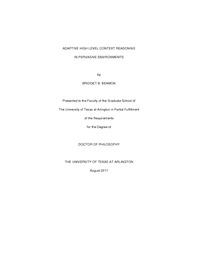
ATTENTION: The works hosted here are being migrated to a new repository that will consolidate resources, improve discoverability, and better show UTA's research impact on the global community. We will update authors as the migration progresses. Please see MavMatrix for more information.
Show simple item record
| dc.contributor.author | Beamon, Bridget B. | en_US |
| dc.date.accessioned | 2011-10-11T20:48:57Z | |
| dc.date.available | 2011-10-11T20:48:57Z | |
| dc.date.issued | 2011-10-11 | |
| dc.date.submitted | January 2011 | en_US |
| dc.identifier.other | DISS-11287 | en_US |
| dc.identifier.uri | http://hdl.handle.net/10106/6184 | |
| dc.description.abstract | It is hard to believe that the Internet is now in its adolescent stage. This information age is replete
with communication capable, intelligent, sensor equipped devices. Social networks, web services,
and global information repositories make a wealth of information available instantly. There exist
endless possibilities for creating useable knowledge. Much of what is considered useable
knowledge is not directly observable from low level sensory devices. Abstract situations,
relationships and activities must be inferred using a variety of techniques that fuse information
from multivariate data sources. We refer to this useable knowledge as high level context. Social,
physiological, environmental, computational, activity, location and situation are but a few categories of high level context used today. In a general sense, context is any domain specific
knowledge relevant to decision making. Low level contexts can be inferred after minimal
manipulation and preprocessing of sensor data. High level context is intrinsically more complex.
High level context involves many levels of data fusion for inferring high level concepts. The
increased dimensionality of representing and reasoning on relationships among contextual
components, factoring uncertainty and ignorance, makes it difficult to effectively reason.
A research problem in the area of context-aware computing is adaptive and effective
high-level context reasoning. Effectiveness refers to the suitability of reasoning methodology for
efficiently reasoning and representing the heterogeneous characteristics of context. Adaptive
reasoning aides in maintaining context content and quality in the face of dynamic resource
availability, degrading reasoning performance and evolving requirements. Context architects are
at times challenged; constrained by the limited reasoning provided in the available platforms.
Incorporating a generalized hierarchical hybrid reasoning engine, offering variety and optimization
for reasoning across heterogeneous complex contexts would provide an effective alternative.
Such architecture integrates a variety of configurable reasoning techniques, supporting the
modularity of complex high level context. Ultimately, it promotes context reasoning framework
reuse, knowledge sharing, and improved context aware application performance.
This research proposes novel enabling solutions for adaptive and effective reasoning in
pervasive environments. The focus is on middleware solutions for deriving and sustaining high
level context, with support for reasoning adaptation and quality maintenance in dynamic
pervasive environments. These solutions provided can be used for initiating context inference
applications or extending existing architectures for greater reusability. Reuse leads to rapid and
innovative context aware application development, a necessary evolution for achieving the vision
of ubiquitous computing and beyond. | en_US |
| dc.description.sponsorship | Kumar, Mohan | en_US |
| dc.language.iso | en | en_US |
| dc.publisher | Computer Science & Engineering | en_US |
| dc.title | Adaptive High Level Context Reasoning In Pervasive Environments | en_US |
| dc.type | Ph.D. | en_US |
| dc.contributor.committeeChair | Kumar, Mohan | en_US |
| dc.degree.department | Computer Science & Engineering | en_US |
| dc.degree.discipline | Computer Science & Engineering | en_US |
| dc.degree.grantor | University of Texas at Arlington | en_US |
| dc.degree.level | doctoral | en_US |
| dc.degree.name | Ph.D. | en_US |
Files in this item
- Name:
- Beamon_uta_2502D_11287.pdf
- Size:
- 10.61Mb
- Format:
- PDF
This item appears in the following Collection(s)
Show simple item record


